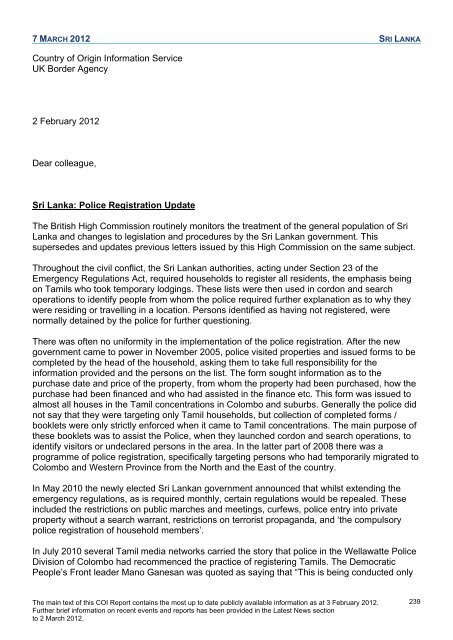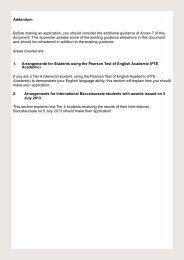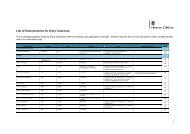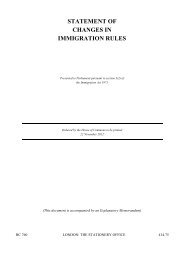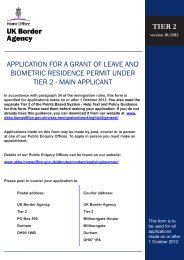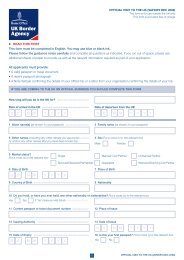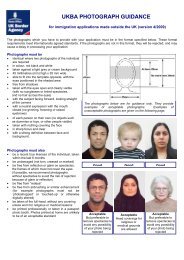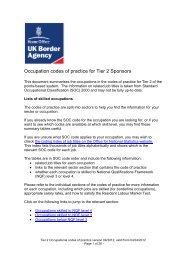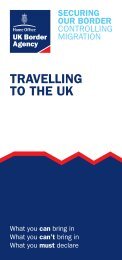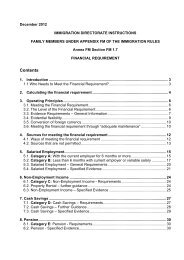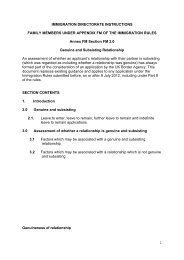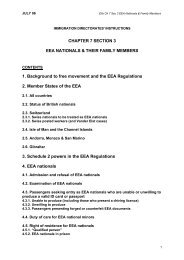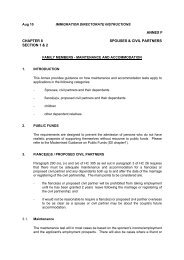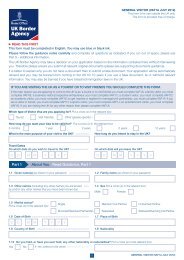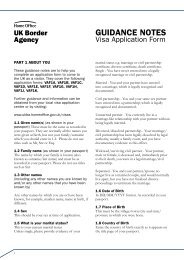COI Report March 2012 - UK Border Agency - Home Office
COI Report March 2012 - UK Border Agency - Home Office
COI Report March 2012 - UK Border Agency - Home Office
Create successful ePaper yourself
Turn your PDF publications into a flip-book with our unique Google optimized e-Paper software.
7 MARCH <strong>2012</strong> SRI LANKA<br />
Country of Origin Information Service<br />
<strong>UK</strong> <strong>Border</strong> <strong>Agency</strong><br />
2 February <strong>2012</strong><br />
Dear colleague,<br />
Sri Lanka: Police Registration Update<br />
The British High Commission routinely monitors the treatment of the general population of Sri<br />
Lanka and changes to legislation and procedures by the Sri Lankan government. This<br />
supersedes and updates previous letters issued by this High Commission on the same subject.<br />
Throughout the civil conflict, the Sri Lankan authorities, acting under Section 23 of the<br />
Emergency Regulations Act, required households to register all residents, the emphasis being<br />
on Tamils who took temporary lodgings. These lists were then used in cordon and search<br />
operations to identify people from whom the police required further explanation as to why they<br />
were residing or travelling in a location. Persons identified as having not registered, were<br />
normally detained by the police for further questioning.<br />
There was often no uniformity in the implementation of the police registration. After the new<br />
government came to power in November 2005, police visited properties and issued forms to be<br />
completed by the head of the household, asking them to take full responsibility for the<br />
information provided and the persons on the list. The form sought information as to the<br />
purchase date and price of the property, from whom the property had been purchased, how the<br />
purchase had been financed and who had assisted in the finance etc. This form was issued to<br />
almost all houses in the Tamil concentrations in Colombo and suburbs. Generally the police did<br />
not say that they were targeting only Tamil households, but collection of completed forms /<br />
booklets were only strictly enforced when it came to Tamil concentrations. The main purpose of<br />
these booklets was to assist the Police, when they launched cordon and search operations, to<br />
identify visitors or undeclared persons in the area. In the latter part of 2008 there was a<br />
programme of police registration, specifically targeting persons who had temporarily migrated to<br />
Colombo and Western Province from the North and the East of the country.<br />
In May 2010 the newly elected Sri Lankan government announced that whilst extending the<br />
emergency regulations, as is required monthly, certain regulations would be repealed. These<br />
included the restrictions on public marches and meetings, curfews, police entry into private<br />
property without a search warrant, restrictions on terrorist propaganda, and ‗the compulsory<br />
police registration of household members‘.<br />
In July 2010 several Tamil media networks carried the story that police in the Wellawatte Police<br />
Division of Colombo had recommenced the practice of registering Tamils. The Democratic<br />
People‘s Front leader Mano Ganesan was quoted as saying that ―This is being conducted only<br />
The main text of this <strong>COI</strong> <strong>Report</strong> contains the most up to date publicly available information as at 3 February <strong>2012</strong>.<br />
Further brief information on recent events and reports has been provided in the Latest News section<br />
to 2 <strong>March</strong> <strong>2012</strong>.<br />
239


